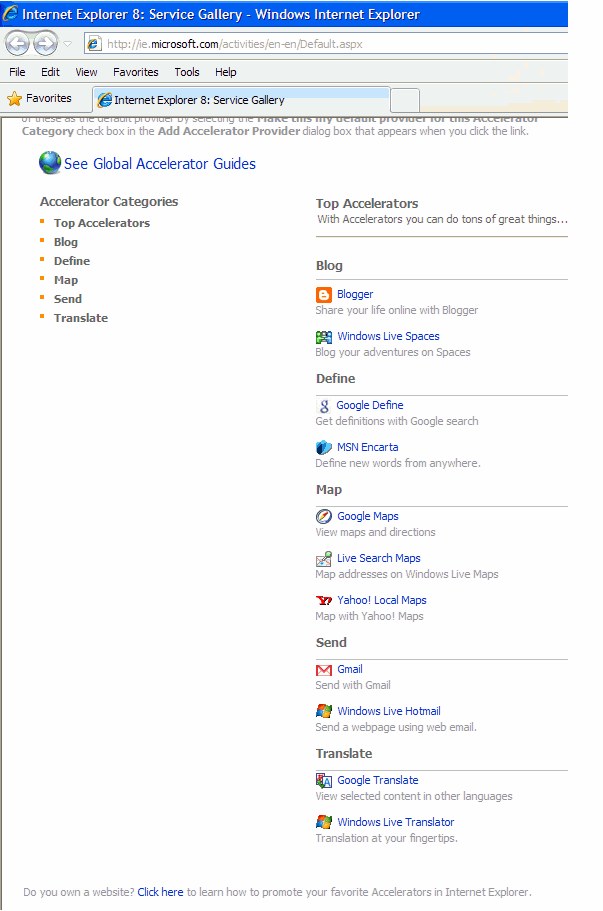Soft-Bundling: The Value of Perceived Authenticity & Transparency
Brian Clark notes the rise of the word authenticity in the field of marketing. Clay Shirky wrote that transparency is the new marketing. For individuals these are true, because if some people grow to like you some will grow to hate you, and it can wear you down to try to fight off a bad reputation in a sound byte culture. Just ask Jim Cramer about Bear Stearns
But for larger companies perceived transparency & authenticity is far more important than actual having either.
Google's Free Ride
Because Google provides a valuable service for free and is easy for end users to like they can get away with a lot of stuff that a company like Microsoft could never do.
Paid Posts
Google's search engineers have waged a war on paid blog posts. Google Japan knew they were operating outside of the guidelines when they were buying links in blogs. Google attempted to sweep the story under the rug until after they knew it was going to get enough exposure that they couldn't effectively do it, and then it became a case study for their anti-spam team, when they applied a fake penalty against their site.
Click Fraud
One of my AdWords content campaigns had an image ad unit that was pulling a 2% clickthrough rate and getting over 600 clicks a day, for a cost near $100 a day. I have already blocked a lot of the nasty no-value exclusion categories but I spent the last couple days blocking some more, and the above $100 a day spend was reduced to $5.42 once the fraud and skimming was removed.
I know Google says they offer some refunds for fraudulent clicks, but some of the stuff in their networks is so fraudulent that the only way to police it is to remove it completely. Over the past year some of these fraudulent sites have got hundreds and thousands of dollars from me for setting up nothing more than a thinly veiled click fraud botnet - feels more like Yahoo! than Google when I looked at the traffic, but at least I was able to filter it out after they stole some of my money.
Such fraud damages the entire ad ecosystem - advertisers have their budgets depleted due to click fraud, legitimate publishers are paid less because content is viewed to have less value when so much of the advertiser ad budgets are blown on click fraud, and web users see lower quality ads because some of the best ads had their budgets blown on click fraud.
Support Piracy
BearShare is an official Google search partner. At one point years ago I saw ads for a company supporting illegal downloads of their very own copyright work. Now Google has moved on toward promoting keywords with Torrent in them on brand searches.

If the domain name has leech, domain, or torrent in it then you know most advertisers do not want to subsidize it. Google needs to make a category for downloads and warez sites. The only reason they have not is because doing so would make people realize how bad some of the content network is.

Reverse Billing Fraud
Many services are marketed as being free or complimentary or just pay shipping, and then in 6 point text in the footer there is a disclaimer about how your credit card will be charged $20 3 times a month until you notice it. These typically promote broad market fads & services like acai berry diets, ringtones, credit checks, and free government grants. A group of con men / scam artists jump from one opportunity to the next to scam consumers using the Google ad network.
The government grants scam made enough of a footprint that the FTC is getting involved. Google claims that they are sorting out the issue:
"Our AdWords Content Policy does not permit ads for sites that make false claims, and we investigate and remove any ads that violate our policies," said Google in a statement e-mailed to ClickZ News. "We have discussed these issues with the Federal Trade Commission and reaffirmed our commitment to protecting users from scam ads."
but a Google search for government grants shows the ads still are running.
Microsoft Gets the Shaft
The Opera CEO believes that Microsoft giving users the option to turn IE 8 off is not enough, and the EU is trying to rip Microsoft apart day by day. Even if Microsoft is able to buy Yahoo! Search it will not be enough to compete. Why? Even when you use Microsoft's products they recommend Google's stuff over their own.

Google's Momentum
While Microsoft is busy fighting off competitors in many markets, Google keeps gaining market-share and market leverage in new verticals through soft-bundling.
One of my clients that did not use Google Checkout simply had to stop advertising on AdWords until Checkout was enabled, because without it the usually slim profit margins on AdWords turned negative. It turns out that pricing ads based on "quality" with a discount for a higher clickthrough rates allows the highest quality advertiser to rank #1, so long as they are using Google Checkout to give Google more market data and another chance at monetization. ;)
The Google Chrome browser is recommended on Youtube, advertised all over the AdSense network, and pushed via bundling partnerships with the likes of the Real player and Divx. Its release forced Microsoft to make some of their security products free, and will keep costing both companies money, with the hope that it costs Microsoft more than it costs Google.
Google is still crying to the EU that Microsoft's business behaviors are uncompetitive. Once you get branded it is hard to get un-branded. In spite of the recent slowdown in search volume Google still has a lot of market momentum behind them. You will know Google is in trouble when the market stops giving them leeway and treats them more like Microsoft.
How You Can Apply This to Your Business Today
1.) Always push to own a market default position and once you achieve that position keep investing in maintaining it, while reminding the market that your growth was organic due to your superior quality.
2.) Even if the business model is not there you can always create one/bolt one on if you get enough exposure. In the age of soft bundling it is no accident that we offer some of the best free distributed SEO tools like the SEO Toolbar and SEO 4 Firefox, with intent of helping push this site into a default market status.
3.) What sorts of distributed marketing can your site benefit from?
- real time data
- unique data interfaces
- widgets
- tools
- open source software
- mashups
- etc.
Each day more options will reveal themselves.




Comments
I love how some microsoft project manager decided it was logical to layout default app choices alphabetically vs via business case....classic tech company fail
I find it absurd that Microsoft is anywhere near that accommodating and yet Google still bitches about them...all the while pushing to commoditize their business model
Yeah, I noticed that they sorted it alphabetically, probably the one time that i wouldn't have..
The problem with the seo book torrent, is that it's such an old version. ;)
I've had nothing but bad experiences working with Google to "optimize" AdWords. The "experts" that advised me seemed to have only one suggestion - spend more. I am in a super-tight niche (from a legal language perspective), and found that though I could drive tons of traffic using broader keywords, they simply did not convert. Even after explaining and proving this to my Google experts (there were 4 on my team of advisors), it was still the only thing they ever suggested...and who wins there? Only Google - they get more money from me, while the users get nothing of value, and I get no conversions. Nice racket. Really soured me on both Google and on Adwords. I hope they redefine "Evil" this year.
Google aims to "own" the consumer's online activity by offering her free and fantastic services in every category possible, and then monetizes this relationship they build with the consumer by selling it to companies who need to make contact with a target market in which Google has a footprint.
The "World's Best Search Engine - Adwords" combo is a bit like the very big tip of a very big iceberg, and every other Google service can be viewed through the lens of this description of their business model
The decisions they make in operating these services should also be seen in terms of Google fighting any attempts by an outside organization to re-direct revenues earned off their services. In the case of ranking penalties: organic SEO vs Adwords.
In the long run, this strategy of owning the consumer side of the transaction relationship is extremely powerful and seems to be in evidence in the business models of many of today's most successful organizations.
I think your analysis is spot on michaell. And the one piece that might be expanded onto would be that Google will make selective partnerships with anything they feel will further their longterm profits, even if it foists scammers onto the consumer.
Attention is bought by Google through any means possible, and whored out to highest bidder, even if they manage to generate such "value" through scamming consumers via reverse billing fraud or other business models with many hidden costs.
Does any one elses see the hypocracy in Google and its "paid to click adds" when we all get penalised to get paid for links or get "Paid-for" links. Take payments to be in directories, like Yahoo for example, this is paid linking, but Google seem to think this is ok - so there are rules to fit the bill, but then I guess if you want to play their game you have to follow their rules, even though they are all stacked in their own favour! It's a bit like spinning a coin and saying "Heads I win, Tails you loose"
Source
Crosses fingers.... :D
Google has won such suits against porn companies for showing thumbnails and has a deal with book publishers. I am thinking that they will have to lose such a suit against a big big company for them to change their ways on that front.
Add new comment